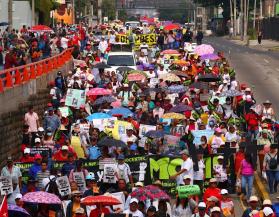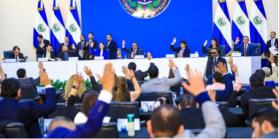Thousands march in Salvadoran Mayday, to celebrate victory and demand change
Also in this update:
-
- Pacific Rim Mining to sue El Salvador inCAFTA arbitration court
- AttorneyGenerals term ends with Assembly divided over successor; Adjunct defiesConstitution in assuming office without legislative approval
- Socialorganizations demand reforms to Supreme Electoral Tribunal
- Assembly banssame-sex marriage, adoption rights; LGBT organizations present counter-proposalto further civil rights
On Friday, May 1st, thousands of workers, campesinos, union activists, students, and social organizations marched in San Salvador to commemorate International Day Workers. The marchers brought with them a spirit of hope as they celebrated the FMLN victory in the March 15 presidential elections and also demands that president-elect Mauricio Funes complete his campaign promises and provide ample space for workers and members of the social movement in the new government that will take office on June 1st. One of the principle demands put forth by speakers, banners, and posters in the march is the creation of the Social and Economic Coordination Forum. The creation of such a forum, which would provide a space for workers and members of the social movement to participate in drafting government policies alongside government official and the private sector, was stipulated. President-elect Mauricio Funes must remember that it was the people that brought him to power, said Wilfredo Romero, Secretary of the Water Workers Union (SETA). Which is why we expect a greater commitment from him, and for him to choose capable functionaries, he added.
Funes, who spoke along with Vice-President-elect Salvador Sanchez Cerén and various leaders of social and popular organizations at the end of the march in the Plaza Cívica, reiterated his commitment to govern for the workers and the most vulnerable sectors of society. In a meeting he had with union leaders two days before the march, Funes stated that I want to end this history in which there is a permanent confrontation between the government and the social movementwhom have not had a possibility of influencing public policies [in the past]. He added, The social movement has something to say and the government is obligated to listen. View Pictures of Fridays march HERE.
Pacific Rim Mining to sue El Salvador in CAFTA arbitration court
Canadian mining company Pacific Rim, acting through a U.S-based subsidiary, announced this week that it will sue the Salvadoran government over the government's refusal to issue mining permits for the El Dorado silver and gold mine in the department of Cabañas. The case will be heard by a special international arbitration court established by the 2006 U.S.-Central America Free Trade Agreement (CAFTA).
Pacific Rim Mining has yet to announce the amount it plans to sue for, but it claims to have already invested over $75 million in exploration for the mining project. CAFTA laws allow companies to sue governments not only for lost investments, but also for lost anticipated revenues that could have resulted from those investments. Legal analysts estimate that Pacific Rim could potentially seek hundreds of millions of dollars from the Salvadoran government.
Metals mining in general, and the El Dorado mine specifically, has been fiercely opposed by Salvadoran civil society, including the Catholic Church. Key civic organizations maintain that the environmentally-responsible mining techniques (called Green Mining) that Pacific Rim claims to practice are a farce, and that a silver and gold mine at El Dorado would result in cyanide contamination of drinking water.
The El Dorado site is located in the basin of the Lempa River, the country's most important source of water. The Lempa provides invaluable irrigation water for much of El Salvador's agricultural industry, as well as drinking water for over half of the population of the greater San Salvador metropolitan area.
Please stay tuned to the CISPES website for updates on this situation and actions you can take: www.cispes.org. And for more information on the Pacific Rim Mining case, please read this previous CISPES update.
Attorney Generals term ends with Assembly divided over successor; Adjunct defies Constitution in assuming office without legislative approval
On April 19, Salvadoran Attorney General Félix Garrid Safie's term in office ended before the Legislative Assembly had voted to elect his successor, opening the door for Adjunct Attorney General Ástor Escalante to assume the top position in defiance of El Salvador's constitution.
The Salvadoran Constitution stipulates that the election of the Attorney General requires the votes of 56 out of 84 Legislative deputies. In a narrowly divided Assembly, and without a compromise candidate having emerged, the right-wing and left-wing parties have been in a stalemate over the confirmation of the nation's top law enforcement official.
Escalante's attempt to take on the functions of Attorney General have created a furor in Salvadoran political and legal circles. Escalante doesnt have constitutional permission, and no person can substitute himself for the exiting Attorney General in this manner, declared Supreme Court Magistrate Marcel Orestes Posada. In these moments, the Office of the Attorney General of the Republic is headless, and everything that Escalante does will be null, as he is not a legal functionary.
Various judges throughout the country have suspended cases until an Attorney General is chosen, noting that criminal charges cannot legally be introduced in the absence of an Attorney General.
The Legislative Assembly has been debating the names of potential Attorneys General since several weeks before the end of Safies term, but no consensus has been reached. The right-wing Nationalist Republican Alliance (ARENA) rejected the ten names presented by the legislative subcommittee responsible for the matter, and is now backing Escalante to continue as the new Attorney General.
The leftist deputies, led by the FMLN, have rejected this possibility, arguing that Escalantes demonstrated allegiance to the ARENA party violates the constitutional requirement that Attorneys General be non-partisan. Eliseo Ortíz of the Institute for Legal Studies of El Salvador (IEJES) echoed the FMLN's concerns about Escalante, saying Previous Attorneys General have maintained a role of guaranteeing impunity for white-collar criminals and organized crime, and this would be precisely the role of Mr. Escalante that [the Office of the Attorney General] continue this practice. Ortíz went on to call ARENAs support for Escalante a deliberate attempt to keep the Attorney General's office vacant, a move intended to cover their backs in terms of all that [crimes] they have committed.
In an analysis of the FMLNs presidential victory on March 15 written shortly after the election, economist Cesar Villalona predicted a series of conflicts over appointments to government offices, including the Attorney General, due to lack of consensus between legislative factions. It is necessary to take into account that what has been won [by the FMLN in the elections] is simply the Executive Branch, and the Right maintains its dominance in other branches and institutions of the State, stated Villalona.
Villalona went on to predict that the Rights strategy over the next five years would be one of sabotaging the FMLN government, particularly through legislative tactics that would create a situation of ungovernability.
Social organizations demand reforms to Supreme Electoral Tribunal
Last week, the Social Initiative for Democracy (ISD) and the Foundation for the Study of the Application of Law (FESPAD), two Salvadoran non-governmental organizations, presented a proposal to the Legislative Assembly to pass a constitutional reform to make the electoral process more fair and transparent. The proposal calls for changes to be made to the make-up of the Supreme Electoral Tribunal (TSE). Currently, the TSE is composed of five magistrates three magistrates represent the three political parties that received the most votes in the most recent election, and two magistrates are proposed by the Supreme Court of Justice (CSJ) and approved by a two-thirds vote in the Legislative Assembly.
According to Ramon Villalta, the executive director of ISD, during the past elections in January and March of this year, it was spoken of a TSE acting and failing to act at the convenience of the political parties, marginalizing the interests of the population, a climate of electoral violence was experienced, a lack of transparency in the process and of arbitrary decisions, where the electoral system was seen seriously debilitated to the point of not completing its principal role.
The executive director of FESPAD Silvia Guillén said the proposed constitutional reform would separate the jurisdictional and administrative functions that the TSE currently possesses. It would create a National Electoral Board that would carry out the administration of the electoral process so the TSE would only be charged with jurisdictional functions. It is also necessary that the magistrates of the TSE be elected, no longer proposed by political parties but by the CSJ, the National Judicial Board, and legally inscribed Universities, said Guillén. The proposed reform would make this change and then require all magistrates to be approved by a two-thirds majority in the assembly.
The FMLN, which won both the presidency and the most legislative seats in the 2009 elections, promoted an electoral reform of this type in its campaign platform. In addition to instances of foreigners voting, electoral violence, vote buying, and other types of fraud, national and international election observers denounced the partisan composition of the TSE and its failure to fulfill its role as neutral arbiter of the electoral process.
In a report by the International Observation Mission of the Salvadoran Foundation for Local Development and Democracy (FUNDASPAD), it was found that, at all levels of electoral administrationfrom the TSE to the Municipal Electoral Boards to the Voting Tables, conflicts were consistently resolved in favor of the governing Nationalist Republican Alliance (ARENA).
Assembly bans same-sex marriage, adoption rights; LGBT organizations present counter-proposal to further civil rights
(Excerpted from reporting by Alexandria Soleil and Maggie Von Vogt in San Salvador.)
After weeks of public debate and protest, El Salvadors Legislative Assembly on Thursday approved an amendment to the constitution that bans marriage and adoption rights for same-sex couples. The amendment was passed in the final hours of the outgoing 2006-2009 Legislative Assembly, which ended April 30th. Newly-elected Legislative Deputies took office on May 1st.
Marriage is only for men and women, born that way. It remains consecrated in our country that this is not possible for same-sex couples, announced Legislative Deputy Rodolfo Parker (Christian Democrat Party), the major proponent of the amendment.
In the period of time leading up to this ratification, the amendment lacked 4 votes to pass. Those votes needed to come from deputies of the leftist FMLN. On Monday, April 27, the party announced that it would not support the amendment because of concerns that it was discriminatory. The wording of the amendment was subsequently negotiated to include the phrase, The State shall foment marriage, but the lack of it will not affect the enjoyment of the rights established by law, after which it attained the number of votes needed to pass.
Politicians had experienced pressure from The Church to ratify the amendment. Various Catholic and Evangelical leaders publicly targeted the FMLN for not supporting the amendment, particularly San Salvadors Archbishop, José Luis Escobar Alas. On April 20th, Alas presented the Assembly with 300,000 signatures in support of the reform and made various public statements urging the FMLN to cast the necessary votes for it to pass.
Lesbian, gay, bisexual and transgender (LGBT) activists who have focused their work on providing education, services, and human rights accompaniment to LGBT Salvadorans immediately mobilized in response. Here the Church has taken a position that does not respect that El Salvador is a secular state. It has wanted to dominate and get involved in situations that are not its duty. We have maintained that, if the reform passes, El Salvador losesin terms that, first, we are a secular state, and second that the Catholic Church does not represent 100% of the citizens, in religion, nor in quantity, said William Hernandez, Executive Director of the organization Associación Entre Amigos (Between Friends), at an April 28th press conference.
Hernandez and Entre Amigos are part of The Alliance for LGBT Diversity, a network of lesbian, gay, bisexual, and transgender individuals and organizations. The Alliance has organized a variety of protests, press conferences and vigils, and have written a counter amendment proposing the expansion of Article 3 of the nations constitution to include sexuality, gender identity, and disability in the non-discrimination clause. We are not asking for marriage, only equality is the resounding message the Alliance has put forth.

 "I am a CISPES supporter because continuing to fight for social justice and a more people-centered country means continuing the dream and sacrifice of thousands of my fellow Salvadorans who died for that vision.” - Padre Carlos, New York City
"I am a CISPES supporter because continuing to fight for social justice and a more people-centered country means continuing the dream and sacrifice of thousands of my fellow Salvadorans who died for that vision.” - Padre Carlos, New York City

